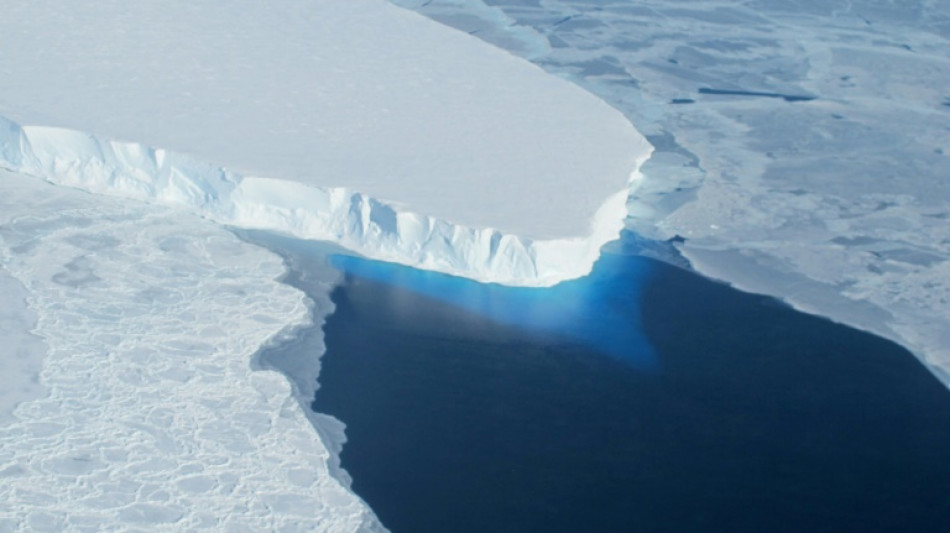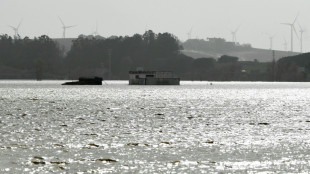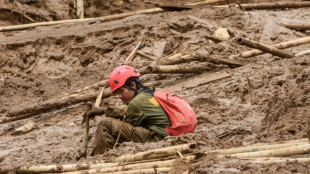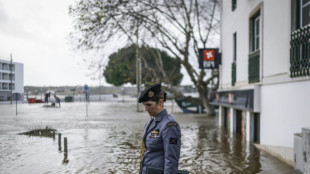
-
 France detects Russia-linked Epstein smear attempt against Macron
France detects Russia-linked Epstein smear attempt against Macron
-
Winter Olympics to open with star-studded ceremony

-
 Trump posts, then deletes, racist clip of Obamas as monkeys
Trump posts, then deletes, racist clip of Obamas as monkeys
-
Danone expands recall of infant formula batches in Europe

-
 Trump deletes racist video post of Obamas as monkeys
Trump deletes racist video post of Obamas as monkeys
-
Colombia's Rodriguez signs with MLS side Minnesota United

-
 UK police probing Mandelson after Epstein revelations search properties
UK police probing Mandelson after Epstein revelations search properties
-
Russian drone hits Ukrainian animal shelter

-
 US says new nuclear deal should include China, accuses Beijing of secret tests
US says new nuclear deal should include China, accuses Beijing of secret tests
-
French cycling hope Seixas dreaming of Tour de France debut

-
 France detects Russia-linked Epstein smear attempt against Macron: govt source
France detects Russia-linked Epstein smear attempt against Macron: govt source
-
EU nations back chemical recycling for plastic bottles

-
 Terror at Friday prayers: witnesses describe blast rocking Islamabad mosque
Terror at Friday prayers: witnesses describe blast rocking Islamabad mosque
-
Iran expects more US talks after 'positive atmosphere' in Oman

-
 US says 'key participant' in 2012 attack on Benghazi mission arrested
US says 'key participant' in 2012 attack on Benghazi mission arrested
-
Why bitcoin is losing its luster after stratospheric rise

-
 Arteta apologises to Rosenior after disrespect row
Arteta apologises to Rosenior after disrespect row
-
Terror at Friday prayers: witness describes 'extremely powerful' blast in Islamabad

-
 Winter Olympics men's downhill: Three things to watch
Winter Olympics men's downhill: Three things to watch
-
Ice dancers Chock and Bates shine as US lead Japan in team event

-
 Stellantis takes massive hit on 'overestimation' of EV demand
Stellantis takes massive hit on 'overestimation' of EV demand
-
Stocks rebound though tech stocks still suffer

-
 Spanish PM urges caution as fresh rain heads for flood zone
Spanish PM urges caution as fresh rain heads for flood zone
-
Iran says to hold more talks with US despite Trump military threats

-
 Russia accuses Kyiv of gun attack on army general in Moscow
Russia accuses Kyiv of gun attack on army general in Moscow
-
Cambodia reveals damage to UNESCO-listed temple after Thailand clashes

-
 Norway crown princess 'deeply regrets' Epstein friendship
Norway crown princess 'deeply regrets' Epstein friendship
-
Italy set for Winter Olympics opening ceremony as Vonn passes test

-
 England's Jacks says players back under-fire skipper Brook '100 percent'
England's Jacks says players back under-fire skipper Brook '100 percent'
-
Carrick relishing Frank reunion as Man Utd host Spurs

-
 Farrell keeps the faith in Irish still being at rugby's top table
Farrell keeps the faith in Irish still being at rugby's top table
-
Meloni, Vance hail 'shared values' amid pre-Olympic protests

-
 Olympic freestyle champion Gremaud says passion for skiing carried her through dark times
Olympic freestyle champion Gremaud says passion for skiing carried her through dark times
-
US urges new three-way nuclear deal with Russia and China

-
 Indonesia landslide death toll rises to 74
Indonesia landslide death toll rises to 74
-
Hemetsberger a 'happy psychopath' after final downhill training

-
 Suicide blast at Islamabad mosque kills at least 31, wounds over 130
Suicide blast at Islamabad mosque kills at least 31, wounds over 130
-
Elton John accuses UK tabloids publisher of 'abhorrent' privacy breaches

-
 Lindsey Vonn completes first downhill training run at Winter Olympics
Lindsey Vonn completes first downhill training run at Winter Olympics
-
Digital euro delay could leave Europe vulnerable, ECB warns

-
 Feyi-Waboso out of England's Six Nations opener against Wales
Feyi-Waboso out of England's Six Nations opener against Wales
-
Newcastle manager Howe pleads for Woltemade patience

-
 German exports to US plunge as tariffs exact heavy cost
German exports to US plunge as tariffs exact heavy cost
-
Portugal heads for presidential vote, fretting over storms and far-right

-
 Suicide blast at Islamabad mosque kills at least 30, wounds over 130: police
Suicide blast at Islamabad mosque kills at least 30, wounds over 130: police
-
Russia says Kyiv behind Moscow shooting of army general

-
 Greenland villagers focus on 'normal life' amid stress of US threat
Greenland villagers focus on 'normal life' amid stress of US threat
-
Iran, US hold talks in Oman after Trump military threats

-
 Stocks waver as tech worries build
Stocks waver as tech worries build
-
Dupont, Jalibert click to give France extra spark in Six Nations bid


Faster West Antarctic Ice Sheet melting unavoidable: study
The melting of West Antarctica's ice shelves is likely to substantially accelerate in coming decades even if the world meets ambitions to limit global warming, according to research Monday, warning it would drive rising sea levels.
Researchers warned that humans had "lost control" of the fate of thinning ice shelves -- frozen ridges floating on the fringes of the main ice sheet that play a stabilising role by holding back the flow of glaciers into the ocean.
This region has already seen accelerating ice loss in recent decades and scientists have said that West Antarctica's vast ice sheet, which holds enough water to lift ocean levels by several metres, could be nearing a climate "tipping point".
In the new study, researchers using computer modelling found that faster ice shelf melting is already inevitable in the coming decades as the ocean warms.
Their results were largely the same even in a scenario where greenhouse gas emissions are slashed and warming stays within the more ambitious Paris Agreement target of 1.5 degrees Celsius since pre-industrial times.
"It appears that we may have lost control of the West Antarctic ice shelf melting over the 21st century," said lead author Kaitlin Naughten, of the British Antarctic Survey.
The research, published in the journal Nature Climate Change, looked at the process of ocean waters melting the underside of the floating ice shelves in the Amundsen Sea.
Even in the best-case scenario, ocean warming was found to be around three times as fast in the 21st century as the 20th century.
"Our simulation suggests that we are now committed to a rapid increase in the rate of ocean warming and ice shelf melting for the rest of the century," Naughten told reporters.
- 'Wake-up call' -
Although researchers did not simulate the exact implications for sea level rise, Naughten said they have "every reason to expect" that the finding would add to the phenomenon, already projected to be up to a metre by the end of the century.
"West Antarctic ice shelf melting is one impact of climate change that we are probably just going to have to adapt to," she said.
Many millions of people across the planet currently live in low-lying coastal areas and she said some "coastal communities will either have to build around or be abandoned".
Alberto Naveira Garabato, professor in physical oceanography at the University of Southampton, said the research was "sobering".
"It illustrates how our past choices have likely committed us to substantial melting of the West Antarctic Ice Sheet and its consequent sea level rise -- to which we will inevitably have to adapt as a society over coming decades and centuries," he told Science Media Centre.
But he stressed that it should also be "a wake-up call" to avoid other severe climate impacts -- including the melting of the East Antarctic ice sheet, which is currently deemed more stable.
"We can still save the rest of the Antarctic Ice Sheet, containing about 10 times as many metres of sea level rise, if we learn from our past inaction and start reducing greenhouse gas emissions now."
The study authors stressed that while ambitious emissions cutting would not make much difference to West Antarctica ice shelf loss in this century, they could have a bigger long-term impact.
The ice sheet is likely to take centuries or even millennia to fully respond to climate change.
Jonathan Bamber, a professor at the University of Bristol's School of Geographical Sciences, cautioned that the study is somewhat limited because researchers used just one ocean model and did not explicitly investigate the effect of warming waters on sea levels.
"This part of West Antarctica contains sufficient ice to raise global sea level by more than a metre so it's important to understand how it will evolve in the future," said Bamber, who was not involved in the research.
S.Abdullah--SF-PST



